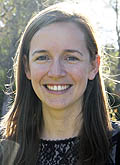Fear or Friction? How Censorship Slows the Spread of Information in the Digital Age
Thursday, November 13, 2014, 2:00–3:30 p.m. • UC Irvine School of Law, MPAA 408 (Map)
A Public Lecture by Molly Roberts
Introduction
What techniques do governments use to prevent the spread of information, and when are they effective? Professor Roberts examines two alternative mechanisms through which censorship could slow the spread of online information. On one hand, censorship could create awareness of sensitive topics, signaling government intent and inducing “fear” so that people self-censor on topics the government deems objectionable. Alternatively, censorship can create “information friction,” making information slightly more difficult and costly to obtain, but keeping the act of censorship itself as invisible as possible. Professor Roberts examines whether each mechanism is effective in slowing the spread of information using a novel experimental design which creates awareness of censorship among consumers of social media in China, in addition to a unique observational dataset that explores how bloggers change topics in reaction to censorship and measures the spread of information about protest events in China. She finds that awareness of censorship on the part of consumers and producers of blogposts does not deter the spread of information and instead often undermines government legitimacy and in- duces information seeking. However, small increases in the cost of information that are not apparent to the public are influential at stopping the spread of information to large, politically meaningful groups of people. Her findings help clarify how citizens are affected by censorship, explain some recent shifts in the Chinese government’s censorship policies, and have broader implications for authoritarian resilience and freedom of information in the digital age.
About the Speaker
 Molly Roberts is Assistant Professor in the Department of Political Science at the University of California, San Diego. Her research interests lie in the intersection of political methodology and the politics of information, with a specific focus on methods of automated content analysis and the politics of censorship in China. She received a Ph.D. from Harvard University in Government (2014), her M.S from Stanford University in Statistics (2009), and her B.A. from Stanford in International Relations and Economics (2009). Her dissertation used blogs, online experiments, and large collections of newspaper articles to understand the influence of censorship and propaganda on the spread of information in China and the United States. She is working on a variety of additional projects that span censorship, propaganda, topic models, and other methods of text analysis. Some of this work has appeared or is forthcoming in Science, American Journal of Political Science, American Political Science Review, and Political Analysis.
Molly Roberts is Assistant Professor in the Department of Political Science at the University of California, San Diego. Her research interests lie in the intersection of political methodology and the politics of information, with a specific focus on methods of automated content analysis and the politics of censorship in China. She received a Ph.D. from Harvard University in Government (2014), her M.S from Stanford University in Statistics (2009), and her B.A. from Stanford in International Relations and Economics (2009). Her dissertation used blogs, online experiments, and large collections of newspaper articles to understand the influence of censorship and propaganda on the spread of information in China and the United States. She is working on a variety of additional projects that span censorship, propaganda, topic models, and other methods of text analysis. Some of this work has appeared or is forthcoming in Science, American Journal of Political Science, American Political Science Review, and Political Analysis.
The Long Institute Lecture Series on Chinese Law, Business and Society
- Learn more about The Long Institute Lecture Series.
- View the schedule for more lectures in this series.
